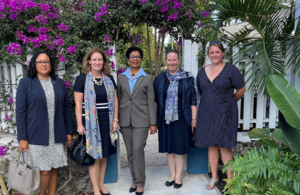Courts to work at full capacity for second year to deliver swifter justice for victims
- no limit on the number of days the Crown Court can sit for new financial year
- nearly 17,000 more days were sat in the Crown Court last year after cap was lifted
- part of a raft of measure to cut backlogs in the courts
The investment means more trials can take place, delivering swifter justice for victims and reducing the backlog of cases which rose significantly due to the pandemic.
The same decision last year meant that nearly 17,000 more days were sat in the Crown Court than the year prior to the pandemic.
The impact of these measures alongside other government action and the collective work of judges, court staff and the legal profession is already being seen. We were among the first in the world to resume jury trials, and the number of outstanding cases in the Crown Court has fallen by around 2,500 since its peak in June 2021.
Despite COVID-19 restrictions and social distancing measures meaning some courtrooms had to temporarily close, over 98,500 days were sat in 2021/22 after the Ministry of Justice lifted the cap, compared to around 82,000 in 2019/20.
Deputy Prime Minister, Lord Chancellor and Secretary of State for Justice, Dominic Raab said:
Getting the courts backlog down is a key priority for this Government so that we can ensure victims get the swift access to justice they deserve.
Alongside the extension of Nightingale Courts, digital hearings and investing significantly in criminal legal aid, we are removing the limit on sitting days for a second year to boost capacity and help drive down the Crown Court backlog of cases.
The Ministry of Justice has spent £250 million so far on dealing with the impact of the pandemic and is investing nearly half a billion pounds (£477 million) in the criminal justice system over the next three years which will help to tackle backlogs in courts and tribunals.
Over 60 Crown courtrooms previously unavailable due to the pandemic have been reopened in the last year and 30 Nightingale courtrooms, originally commissioned to provide extra capacity for socially-distanced trials, will stay open until March 2023. This means around 500 Crown courtrooms are now available for hearings and trials.
Today’s announcement builds on a raft of measures already introduced to speed up justice for victims and improve the justice system since the start of the pandemic, including:
- Increasing spending on criminal legal aid by £135 million a year, including a fee increase which will see a typical criminal barrister earning nearly £7,000 extra per year.
- Rolling out video technology to over 70 percent of all courtrooms and opening 3,265 virtual court rooms across all jurisdictions. These currently hold around 13,600 hearings per week, compared to just a handful before the pandemic.
- Legislating to double the sentencing powers available to magistrates from 6 months to a year to free up an estimated 1,700 extra sitting days of Crown Court time each year.
- Investing almost £450 million over the next 3 years into victim and support services.
- Creating 2 ‘super courtrooms’ which can accommodate up to 12 defendants simultaneously; increasing capacity for large, complex trials.
- Raising the statutory mandatory retirement age from 70 to 75 for judicial office holders, estimated to retain an extra 400 judges and tribunal members and 2,000 magistrates per year across all jurisdictions.
